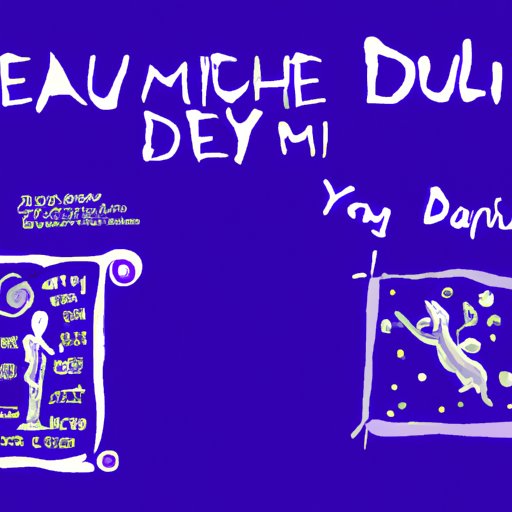
Introduction
Deja vu is a feeling of familiarity that one experiences when in a new situation or environment. It is as if the person has lived through the experience before. The phenomenon has captured the attention of many people, with approximately 60-70% of individuals experiencing it at some point in their lives. It is known to affect people of all ages and cultures. It is essential to explore the science behind Deja Vu to help understand it better.
Exploring the Science Behind Deja Vu
The science behind deja vu is fascinating. The term “deja vu” originated in the French language and means “already seen.” The human brain is responsible for this phenomenon. Research has shown that deja vu occurs when the brain recognizes a situation or an environment as similar to one it has already experienced, but it has difficulty retrieving the memory of the initial experience.
One theory suggests that deja vu occurs because of a mismatch in the brain’s recognition and retrieval processes. As a result, the brain perceives the current situation as a previously experienced but forgotten one.
Studies conducted on Deja Vu have shown that it occurs more often in individuals who are fatigued or under stress. This is because the brain’s memory retrieval system is more likely to make mistakes when stress is involved.
Other interesting facts about deja vu include its connection to epilepsy. Patients with temporal lobe epilepsy (TLE) are known to experience deja vu more frequently than individuals without TLE. This is because the temporal lobe is responsible for storing and retrieving memories.
Debunking Common Myths About Deja Vu
There are many myths surrounding deja vu, with the most common being that it is caused by paranormal activity. However, studies have shown that this is not true. Instead, it is a normal occurrence that happens in most people at some point in their lives.
Another myth surrounding deja vu is that it is a sign of a mental disorder. However, this is also untrue. Deja vu is a natural phenomenon that can happen in healthy individuals.
Lastly, there is a myth that deja vu occurs only to certain types of people. However, it can happen to anyone, regardless of age, gender, or ethnicity.
A Personal Account of Experiencing Deja Vu
One person’s experience of Deja Vu can differ from another’s. One person might feel the sensation of having been in a particular place before or have the feeling of conversing with someone but cannot place when. Some can feel a sense of unease, while others cherish the experience.
Personally, experiencing deja vu feels like being in a dream world. I can’t comprehend how I know something I couldn’t possibly know. The feeling is eerie, and it sets my heart racing, even though I know that the situation is familiar.
Deja Vu in Popular Culture: Movies, TV Shows, and Music
Deja vu has been famously portrayed in movies such as “The Matrix” and “Source Code,” where it is used as a plot device. In “The Matrix,” Neo has a feeling of deja vu about a black cat walking past him twice in the same scene. In “Source Code,” the protagonist experiences deja vu as a result of quantum mechanics. It is often used in music, from pop to rock. Songs such as “Deja Vu” by Beyoncé and “Deja Vu” by Post Malone and Justin Bieber, both have deja vu as the central theme.
Although deja vu has helped movies, TV shows, and music to convey an eerie feeling, there have been instances where it is depicted inaccurately. It is not always as intense as shown on screen or as frequent as it might appear to be.
Can Deja Vu Be Used to Predict the Future?
The thought of deja vu being able to predict the future is widely debated. The theory is that deja vu could be a sign of a premonition. Premonition refers to getting glimpses of something that has not yet happened. The theory suggests that when one experiences a situation that is similar to the premonition, the brain makes the connection and produces the sensation of deja vu.
While it is possible that deja vu could be a premonition, there is no concrete evidence to prove it. It could also just be a simple coincidence that the situation is familiar to one’s brain.
Deja Vu: Is It a Sign of a Past Life?
The theory that deja vu is a remembrance of past lives is also debated. The concept suggests that when one experiences deja vu, it could signify that they have lived a similar experience in a past life.
There is no scientific evidence to support the theory that deja vu is a sign of a past life. It could just be an illusion that one’s brain creates to make sense of the current situation.
Conclusion
In conclusion, deja vu is a natural phenomenon experienced by most people. The science behind it is fascinating, and research has shown that a tired or stressed mind is more likely to experience episodes of deja vu. It is a common myth that deja vu is caused by paranormal activity. Personal accounts of experiencing deja vu can differ from person to person. It is depicted inaccurately in movies, TV shows, and music. The likelihood of deja vu predicting the future or signifying a past life is debated and has no concrete evidence.
Share your experience of Deja Vu in the comments and let us know how it felt for you.




